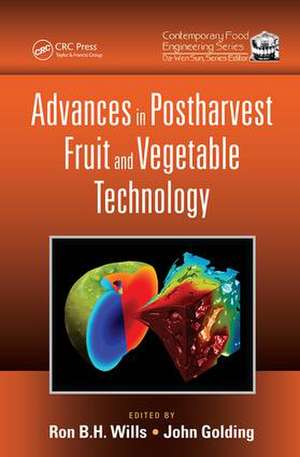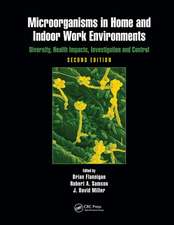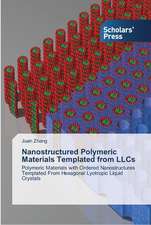Advances in Postharvest Fruit and Vegetable Technology: Contemporary Food Engineering
Editat de Ron B.H. Wills, John Goldingen Limba Engleză Paperback – 28 iun 2018
- Using more natural chemicals or physical treatments to replace synthetic chemicals
- Increasing the efficiency of older, more traditional methods in combination with newer biocontrol treatments
- Leveraging a range of biomolecular research tools or "omics" to efficiently gather and assess mass information at molecular, enzymic, and genetic levels
- Using modelling systems to identify key changes and control points for better targeting of new treatments and solutions to postharvest problems
| Toate formatele și edițiile | Preț | Express |
|---|---|---|
| Paperback (1) | 669.94 lei 6-8 săpt. | |
| CRC Press – 28 iun 2018 | 669.94 lei 6-8 săpt. | |
| Hardback (1) | 1798.57 lei 6-8 săpt. | |
| CRC Press – iun 2015 | 1798.57 lei 6-8 săpt. |
Din seria Contemporary Food Engineering
- 9%
 Preț: 694.91 lei
Preț: 694.91 lei - 25%
 Preț: 485.49 lei
Preț: 485.49 lei - 28%
 Preț: 1475.18 lei
Preț: 1475.18 lei - 18%
 Preț: 709.45 lei
Preț: 709.45 lei - 28%
 Preț: 1363.02 lei
Preț: 1363.02 lei - 28%
 Preț: 993.44 lei
Preț: 993.44 lei - 18%
 Preț: 1834.06 lei
Preț: 1834.06 lei - 29%
 Preț: 1351.60 lei
Preț: 1351.60 lei - 15%
 Preț: 669.94 lei
Preț: 669.94 lei - 15%
 Preț: 540.06 lei
Preț: 540.06 lei - 27%
 Preț: 524.78 lei
Preț: 524.78 lei - 15%
 Preț: 500.33 lei
Preț: 500.33 lei -
 Preț: 455.78 lei
Preț: 455.78 lei - 18%
 Preț: 718.13 lei
Preț: 718.13 lei - 18%
 Preț: 1336.32 lei
Preț: 1336.32 lei - 24%
 Preț: 476.05 lei
Preț: 476.05 lei - 9%
 Preț: 1355.12 lei
Preț: 1355.12 lei - 18%
 Preț: 700.75 lei
Preț: 700.75 lei - 18%
 Preț: 1359.95 lei
Preț: 1359.95 lei - 25%
 Preț: 552.60 lei
Preț: 552.60 lei - 29%
 Preț: 1101.89 lei
Preț: 1101.89 lei - 14%
 Preț: 2143.53 lei
Preț: 2143.53 lei - 25%
 Preț: 1112.81 lei
Preț: 1112.81 lei - 28%
 Preț: 1045.74 lei
Preț: 1045.74 lei - 18%
 Preț: 705.50 lei
Preț: 705.50 lei - 18%
 Preț: 1346.58 lei
Preț: 1346.58 lei - 28%
 Preț: 989.77 lei
Preț: 989.77 lei - 18%
 Preț: 1256.42 lei
Preț: 1256.42 lei - 18%
 Preț: 1671.73 lei
Preț: 1671.73 lei - 30%
 Preț: 935.69 lei
Preț: 935.69 lei - 18%
 Preț: 1277.90 lei
Preț: 1277.90 lei - 31%
 Preț: 1850.48 lei
Preț: 1850.48 lei - 29%
 Preț: 1246.37 lei
Preț: 1246.37 lei - 18%
 Preț: 1815.14 lei
Preț: 1815.14 lei - 25%
 Preț: 473.94 lei
Preț: 473.94 lei - 28%
 Preț: 987.72 lei
Preț: 987.72 lei - 28%
 Preț: 1415.04 lei
Preț: 1415.04 lei - 29%
 Preț: 1184.60 lei
Preț: 1184.60 lei - 28%
 Preț: 1413.83 lei
Preț: 1413.83 lei - 29%
 Preț: 1239.41 lei
Preț: 1239.41 lei
Preț: 669.94 lei
Preț vechi: 788.16 lei
-15% Nou
Puncte Express: 1005
Preț estimativ în valută:
128.19€ • 133.84$ • 106.10£
128.19€ • 133.84$ • 106.10£
Carte tipărită la comandă
Livrare economică 05-19 aprilie
Preluare comenzi: 021 569.72.76
Specificații
ISBN-13: 9781138894051
ISBN-10: 1138894052
Pagini: 404
Dimensiuni: 156 x 234 x 21 mm
Greutate: 0.45 kg
Ediția:1
Editura: CRC Press
Colecția CRC Press
Seria Contemporary Food Engineering
ISBN-10: 1138894052
Pagini: 404
Dimensiuni: 156 x 234 x 21 mm
Greutate: 0.45 kg
Ediția:1
Editura: CRC Press
Colecția CRC Press
Seria Contemporary Food Engineering
Public țintă
Professional ReferenceCuprins
Advances in understanding consumer behavior. Managing preharvest operations for postharvest quality. Non-destructive quality assessment. Advances in CA/MA storage technology. Advances in use of 1-MCP. Advances in edible coatings. Low ethylene technology in non-optimal storage temperatures. Potential new postharvest treatments. Potential of NO as a postharvest technology. 'Omics' solutions to postharvest problems. Biological control of postharvest diseases. Physical and chemical control of postharvest diseases. Technologies to manage flavor and phytochemicals. Developments in maintaining fresh-cut quality. New technologies for market access. Organic postharvest technology. Advances in engineering and energy use. Modeling postharvest quality.
Recenzii
"Exceptionally informed and informative, impressively well written, organized and presented, "Advances in Postharvest Fruit and Vegetable Technology" is an ideal textbook on the subject, as well as a critically and immensely important addition to professional, college, and university library Agricultural Sciences collections and supplemental studies reading lists."
-Carl Logan, Reviewer's Bookwatch: August 2018
Also available at http://www.midwestbookreview.com
-Carl Logan, Reviewer's Bookwatch: August 2018
Also available at http://www.midwestbookreview.com
Descriere
The postharvest handling of fresh fruits and vegetables plays a critical role in facilitating a continuous supply of high-quality fresh produce to the consumer. Many new technologies developed and refined in recent years continue to make possible an ever-expanding supply of fresh products. This volume examines a range of recently developed technologies and systems that will help the horticulture industry to become more environmentally sustainable and economically competitive, and to minimize postharvest quality loss and generate products that are appealing and acceptable to consumers.













